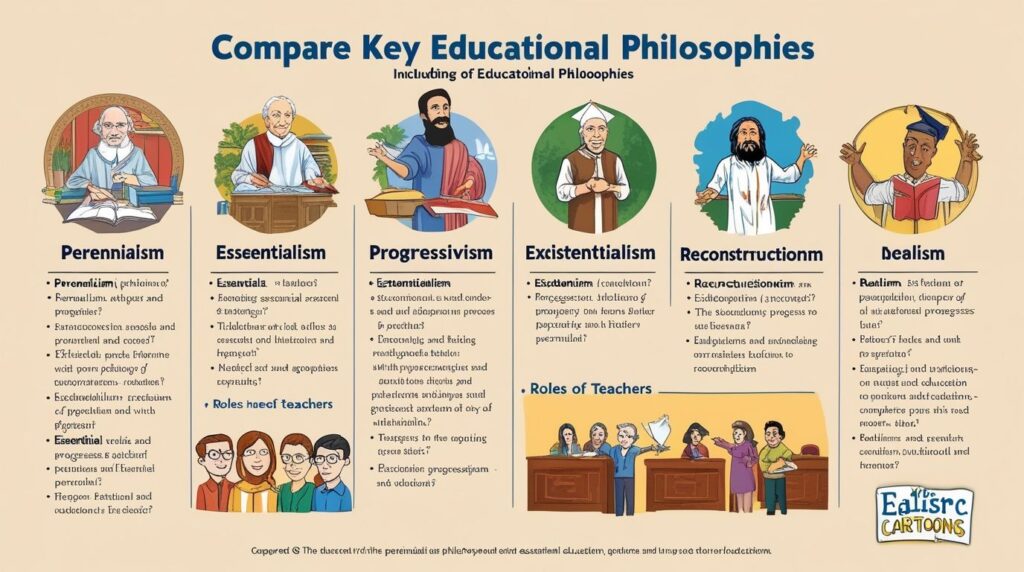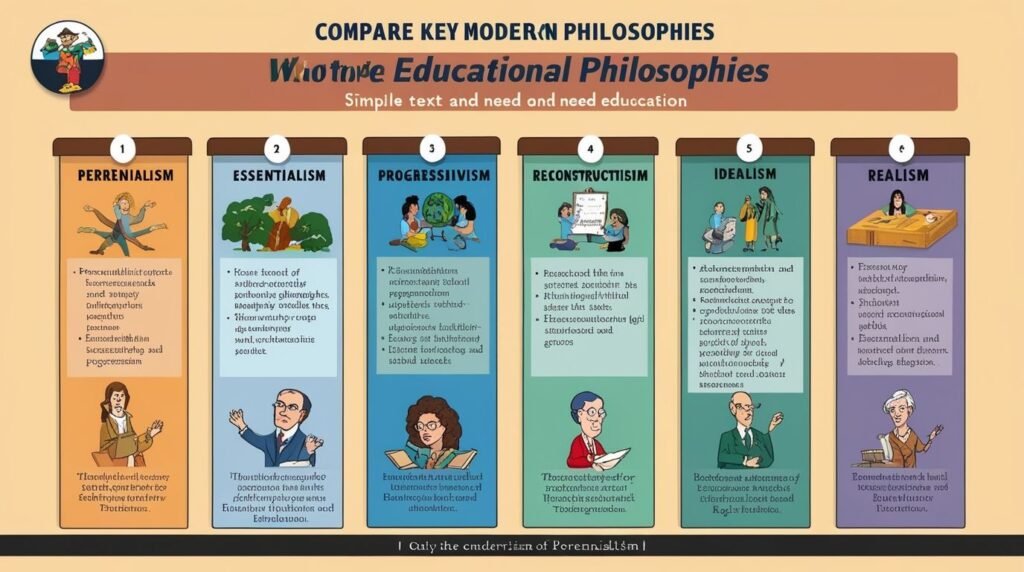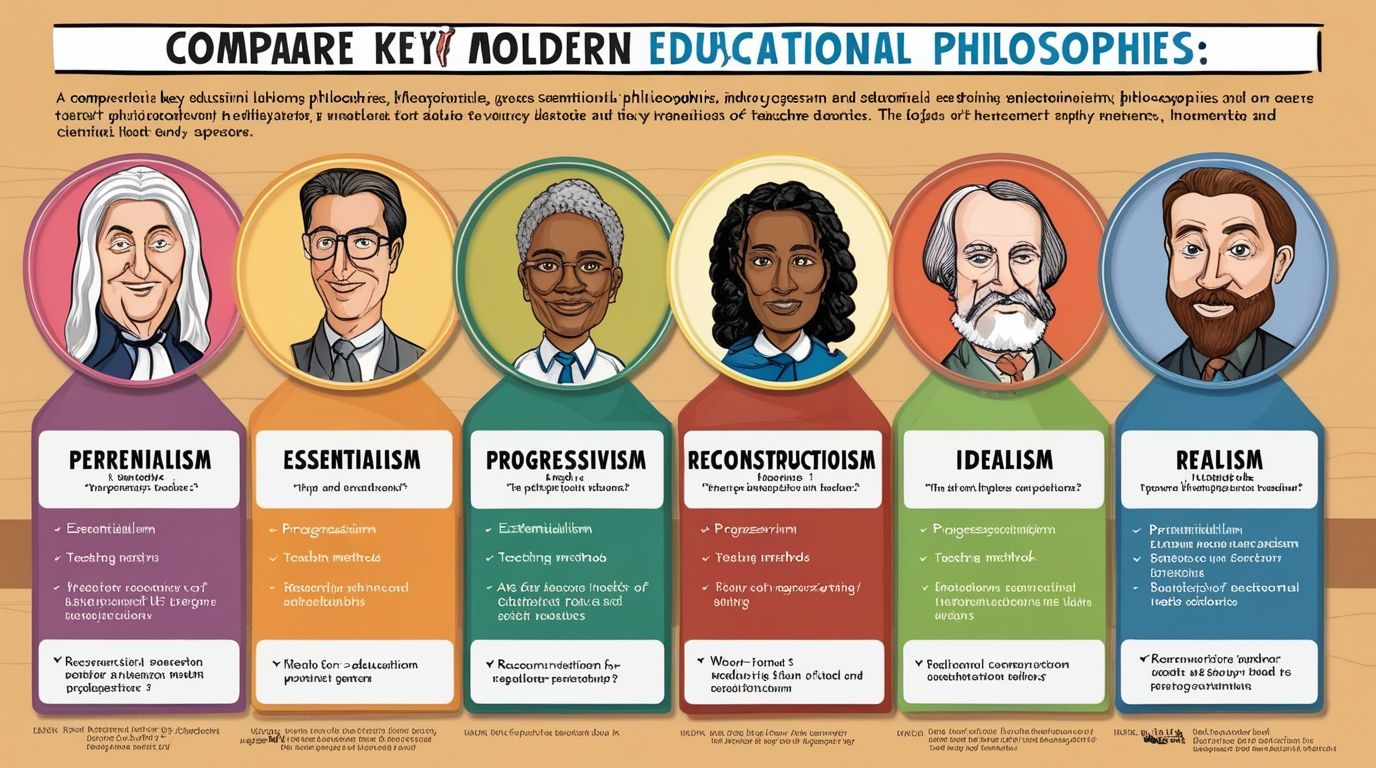Comparison of Educational Philosophies, Education, a cornerstone of societal development, is deeply influenced by various philosophical perspectives. These educational philosophies offer diverse viewpoints on the nature of knowledge, the role of the teacher, the purpose of education, and the methodology of teaching. This article compares key educational philosophies, including perennialism, essentialism, progressivism, existentialism, reconstructionism, idealism, and realism, highlighting their principles, methods, and implications.
1. Perennialism
Core Principles
Perennialism asserts that education should focus on enduring ideas and universal truths that have stood the test of time. This philosophy emphasizes classical works in literature, philosophy, and science, believing that these provide the foundation for intellectual growth and moral development.
Role of the Teacher
In perennialism, the teacher is a guide and intellectual authority who facilitates students’ engagement with great works and timeless concepts. The teacher encourages critical thinking and reasoned debate.
Teaching Methods
The methodology involves Socratic dialogue, close textual analysis, and rigorous discussion. The curriculum often includes the classics of Western civilization, fostering intellectual discipline.
Criticism
Perennialism has been criticized for being overly rigid and neglecting contemporary issues. Its focus on traditional texts may exclude diverse cultural perspectives.
2. Essentialism
Core Principles
Essentialism emphasizes a structured, core curriculum designed to instill essential knowledge and skills. This philosophy aims to prepare students to become productive members of society through mastery of fundamental subjects such as reading, writing, mathematics, and science.
Role of the Teacher
Teachers in essentialist classrooms are authoritative figures who deliver a well-organized curriculum. They emphasize discipline and hard work to ensure academic achievement.
Teaching Methods
Essentialist methods prioritize lectures, standardized testing, and rote learning to reinforce foundational knowledge. Practical application of skills is also a focus.
Criticism
Critics argue that essentialism can stifle creativity and individuality by placing excessive emphasis on standardized testing and traditional subjects.

3. Progressivism
Core Principles
Progressivism, influenced by the ideas of John Dewey, advocates for education that is student-centered and experiential. It focuses on developing critical thinking, problem-solving, and adaptability by engaging with real-world issues.
Role of the Teacher
Teachers in progressive classrooms act as facilitators, guiding students through experiential learning and encouraging exploration and collaboration.
Teaching Methods
Experiential learning, group projects, and problem-solving activities are hallmarks of progressivism. The curriculum is flexible and evolves based on students’ interests and societal needs.
Criticism
Progressivism faces criticism for potentially lacking structure and rigor. Some argue that its focus on student interests might compromise comprehensive knowledge acquisition.
4. Existentialism
Core Principles
Existentialism in education emphasizes individual freedom, choice, and personal responsibility. This philosophy aims to help students discover their unique purpose and develop self-awareness.
Role of the Teacher
Teachers serve as mentors, creating an environment where students can explore their values, beliefs, and identities. They encourage students to take ownership of their learning.
Teaching Methods
Existentialist approaches include open-ended discussions, self-directed learning, and exploration of personal interests. Students often engage in reflective activities and creative expression.
Criticism
Critics argue that existentialism’s emphasis on individual freedom might lead to a lack of structure and measurable outcomes in education.

5. Reconstructionism
Core Principles
Reconstructionism seeks to address social injustices and promote societal transformation through education. This philosophy views schools as agents of change, emphasizing critical thinking and social responsibility.
Role of the Teacher
Teachers in reconstructionist classrooms are activists who challenge students to question societal norms and engage in projects that address social issues.
Teaching Methods
The methodology includes service-learning, community projects, and critical pedagogy. Students are encouraged to connect their learning to societal challenges and work toward solutions.
Criticism
Reconstructionism is sometimes criticized for its political overtones and potential to prioritize activism over academic content.
6. Idealism
Core Principles
Idealism emphasizes the importance of ideas, values, and the mind in shaping reality. Education, from this perspective, focuses on fostering intellectual and moral excellence by exploring the world of ideas and universal truths.
Role of the Teacher
In idealism, the teacher is a role model and intellectual guide who inspires students to strive for self-improvement and engage with profound philosophical and ethical questions.
Teaching Methods
Teaching methods include dialogue, lectures, and discussions that explore philosophical and ethical issues. Literature, art, and history are emphasized to cultivate moral and intellectual virtues.
Criticism
Critics argue that idealism may overlook practical skills and the material aspects of education, focusing excessively on abstract ideas.
7. Realism
Core Principles
Realism focuses on the physical world and objective reality, asserting that education should be grounded in observable facts and scientific principles. It prioritizes knowledge acquisition that aligns with the natural laws of the world.
Role of the Teacher
Teachers in realism are experts who impart factual knowledge and encourage students to engage with empirical evidence and logical reasoning.
Teaching Methods
Realist approaches include experiments, demonstrations, and evidence-based inquiry. Science, mathematics, and technology are often prioritized in the curriculum.
Criticism
Realism has been critiqued for potentially neglecting the emotional and creative aspects of education, focusing too narrowly on factual knowledge.
Comparative Analysis
| Aspect | Perennialism | Essentialism | Progressivism | Existentialism | Reconstructionism | Idealism | Realism |
|---|---|---|---|---|---|---|---|
| Focus | Universal truths | Core knowledge and skills | Student interests and experiences | Individual freedom and purpose | Social change and justice | Ideas and moral values | Objective reality |
| Curriculum | Classics and great works | Structured core subjects | Flexible, real-world topics | Self-directed | Social issues | Literature, philosophy, ethics | Science, mathematics, facts |
| Teacher’s Role | Intellectual authority | Authoritative | Facilitator | Mentor | Activist | Role model | Expert |
| Methods | Dialogue, analysis | Lectures, standardized tests | Experiential learning | Reflective, creative activities | Service-learning | Discussion, lectures | Experiments, evidence-based |
| Criticism | Rigid, Eurocentric | Stifles creativity | Lacks rigor | Lacks structure | Politicized, less academic focus | Overlooks practical skills | Neglects emotional creativity |
Modern Educational Practices
In practice, many educational systems integrate aspects of these philosophies to create balanced approaches. For example, a curriculum might combine essentialist emphasis on foundational knowledge with progressive methodologies that encourage critical thinking. Similarly, existentialist principles are often incorporated through personalized learning plans, while reconstructionist ideas appear in civic education programs. Idealist and realist perspectives influence the balance between fostering moral values and teaching practical skills.
Conclusion
The comparison of educational philosophies reveals their diverse approaches to learning and teaching, each with unique strengths and limitations. By understanding these philosophies, educators can adopt strategies that cater to students’ needs and societal demands. The future of education lies in synthesizing these perspectives to foster intellectual, personal, and social growth.

9 thoughts on “Comparison of Educational Philosophies”
Comments are closed.